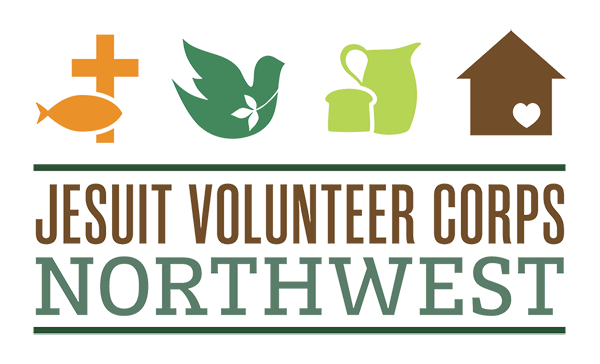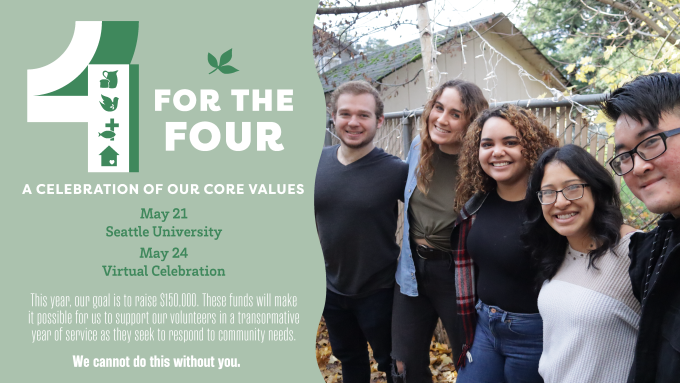Reflections on Re-Centering and Family
Please help support current and future JVs by giving to our year-end Family Together Campaign.

— An interview with Maggie Ayau (Hays, MT ’14’15, St. Xavier, MT ’15-16, Staff ’16-19)
What were the name of your placements and what did you do at your placements? What did a typical day look like for you?
From 2014-15 I was a 2nd Grade Teacher at St. Paul’s Mission Grade School in Hays, Montana, a small
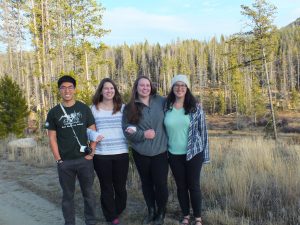
community on the Ft. Belknap Indian Reservation belonging to the Aaniiih (Gros Ventre/White Clay) and Nakoda (Assiniboine) nations. As one of the two K-6 schools on the reservation, Mission provides critical access to education for children and families in Hays — about 12 of whom were in my class.
The following year I was a JV in St. Xavier, Montana, a rural area on the reservation lands of the Apsaalooke (Crow) nation. I served as an Academic Support Specialist with a K-8 school called Pretty Eagle Catholic Academy, where I provided various student supports and interventions focusing primarily on literacy both in and outside of the classroom.
Can you describe a client interaction or in-service experience that stood out to you?
One of the most valuable things I learned from my students was how to prioritize relationships over results. At Pretty Eagle I met with a young student who did not read aloud. I assumed that it was because they needed more practice with fluency, but I realized after our first tutoring session that while building fluency would be helpful for this student, it couldn’t be our only goal; their struggle was not necessarily a lack of fluency, but a lack of confidence. They felt discouraged in the classroom and didn’t seem to have a support system of people who gave them the stability of acceptance and positive affirmation. My role, then, became about helping this student feel visible and significant: noticing them, asking thoughtful questions, and listening without judgement. Most importantly it meant allowing them the time to build trust with me and with themselves, even if it meant not seeing results right away.
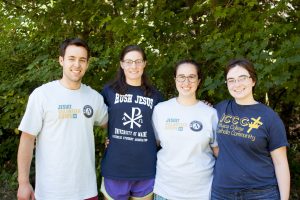
One week they mentioned that they loved the Lego movie, so the next week we read a few pages of the movie’s script. They got into character and everything. They said, “I didn’t know I could read stuff like that!” I think it was an empowering moment of realization that their interests were worthy of representation in their learning environment. They were capable of reading all kinds of things — by now in 2020, they could read the script to the second Lego movie!
The student did build fluency eventually, but what made me most proud was that they discovered a new glimpse of their own potential, not solely through their academic progress (although that was a great achievement), but through what I hope was a better understanding of their inherent value and power. Their ideas and personality and presence were important, regardless of their reading level. This is just one example of how so much of the service I felt I provided was not actually academic, but deeply relational.
The theme this year is “Re-Center Together.” How has that theme informed your service or work? How has the theme informed your personal and/or spiritual growth?
I like that the theme can be read in multiple ways. One that resonates for me (English nerd alert) is interpreting “together” not as an adverb (describing the way in which you perform the action, i.e. recenter together, versus recenter alone) but instead as a noun (“together” as an idea, i.e. recenter togetherness). When I think about it this way, I ask myself: how do I understand what it means to be together? How are my politics, my spirituality, my professional work, my relationships, all of it, directed by the profound Togetherness that I believe is at the center of all things? How do I make room in my daily grind to return to that central cosmic relationship?
Another way I read this theme has to do with the way our society constructs and protects the center as a place of power. I’m learning how to recognize the ways I have consciously and unconsciously participated in systems that remove people from the center. I’m learning how to give power back when I can — to move it across barriers and muddy the lines that demarcate the center from the much wider periphery.
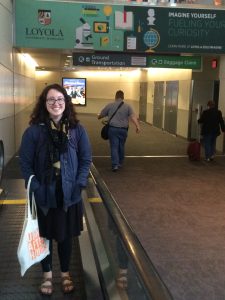
From that place, I’m also learning how to do the inner work that is needed to responsibly participate in an alternative system: one in which power is not held in a single center surrounded by margins, but distributed across multiple centers constituting a similar, ever-expanding whole. Adrienne maree brown calls this a fractal conception, and she writes a lot about it in her book Emergent Strategy. Her writing has helped me understand that this concept of fractalization — which requires diversity, plurality, inclusion, belonging, interconnectedness — is an essential characteristic of the Togetherness we struggle for on a collective level.
What does it mean to you having a family member “together” with you as you experience your own journey? How does JVC Northwest values and/or Catholic Social Teaching inform how you interact as family members?
There are times when it is hard for me to fully convey the complexities of my years of service because being a JV can be a very specific kind of experience. It has been really fun to have someone in the family who can understand that experience on a personal level.
Even more than that, Lily and I are five years apart. This precise age difference has set us up (at least until this point) to never quite be in the same stage of life at the same time. When I graduated high school she was still in middle school, and when she graduated high school I was already out of college. But now we have this in common — and it does feel like we are sharing in something together, even though my years of service are technically over. My years of service continue to be such a point of reference for me that the experience still feels very present, as do my ongoing relationships with my community mates. This connection has led to many long and thoughtful conversations as we both explore the four values and process our service experiences at different places of distance from them. It has led to new levels of honesty, especially when it comes to our own family dynamics and histories. I think the conclusions we’ve drawn and the questions we’ve raised — both independently and together — contribute to the ongoing and necessary work of our family’s collective formation.
